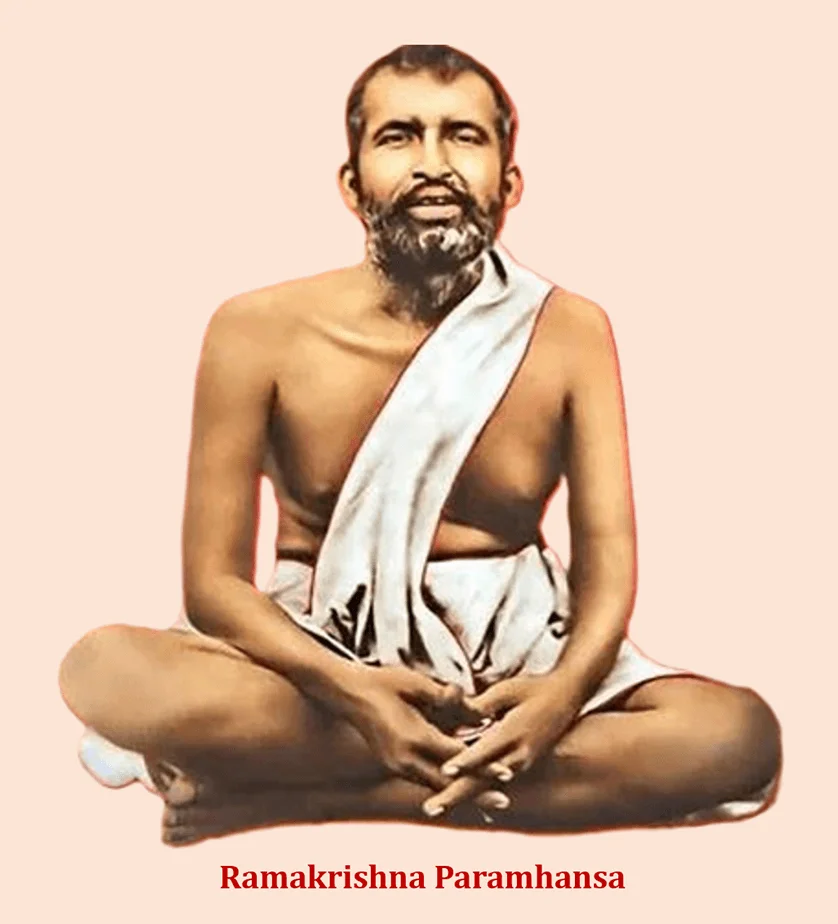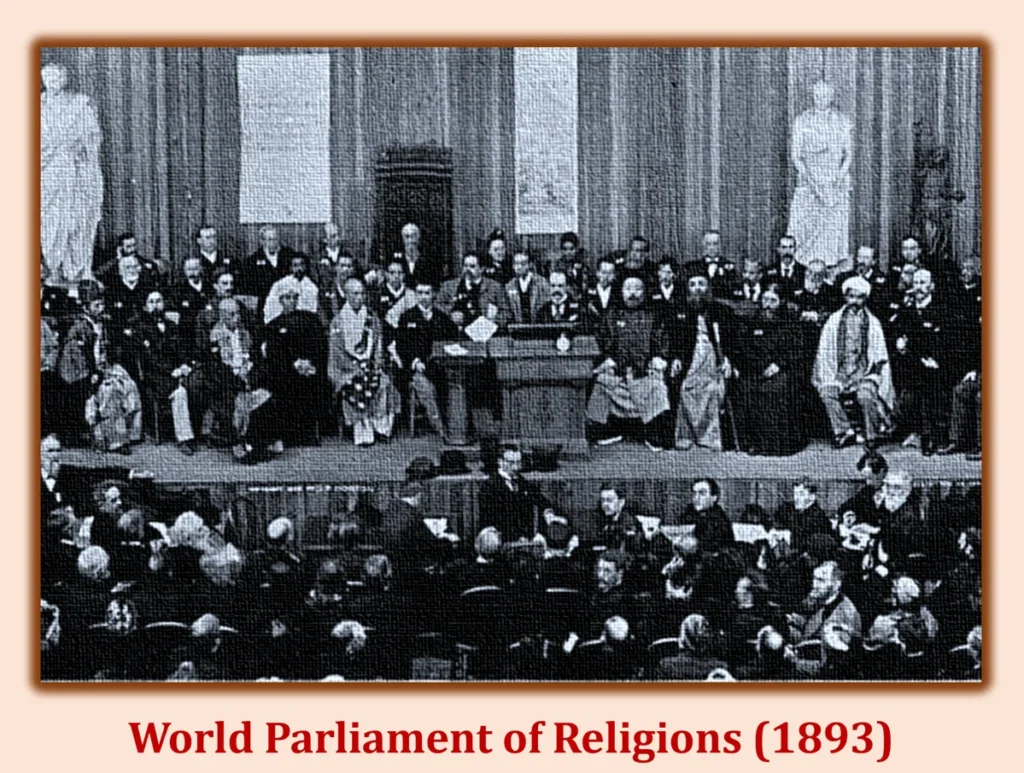
Introduction
An Introduction to Swami Vivekananda
The well-known spiritual figure Swami Vivekananda lived from 1863 to 1902. Initially he was known as Narendranath Datta. He was the disciple of the famous saint Ramakrishna Paramahansa. Swami Vivekananda made a substantial contribution to the propagation of Yoga and Vedanta concepts during the century.
The Impact of Swami Vivekananda’s Teachings on Society
Swami Vivekananda’s teachings deeply resonated with people from all backgrounds. His captivating speeches, lectures and his address at the World Parliament of Religions in Chicago in 1893 had an ever-lasting impact on audiences worldwide. He emphasized the importance of harmony, acceptance and unlocking everyone’s potential. Additionally, his words transcended borders and touched the hearts of people across nations. The impact of Swami Vivekananda can be observed across different aspects of society. His emphasis on education and knowledge led to the establishment of institutions and libraries that continue to benefit individuals today. He also advocated for women education and empowerment while recognizing their role in progress.
Vivekananda’s teachings served as a source of inspiration for movements aimed at bringing about reform empowering those who were marginalized and advocating for equality. Vivekananda brought a perspective to spirituality, motivating people to embark on their personal spiritual paths while actively participating in the world. His teachings offered comfort to those searching for a purpose in life. Moreover, he sparked a passion for self-improvement and contribution to the society. In times Swami Vivekananda’s concepts remain a source of inspiration to millions serving as a reminder of our inherent divine nature and limitless possibilities within us.
Early Life and Spiritual Awakening
Swami Vivekananda’s Early Life and Family Background
The aforementioned Narendranath Datta was the original name of Swami Vivekananda. January 12, 1863, was his birthdate in Calcutta. He was brought up emphasizing spirituality and education because he was born into a Bengali family. Bhuvaneshwari Devi, Narendranath’s mother was well-known for her piety and religious devotion while his father Vishwanath Datta was a lawyer. The nurturing atmosphere at home instilled within Vivekananda a passion for truth, knowledge acquisition and spiritual exploration.
Meeting Ramakrishna Paramahansa
Swami Vivekananda’s interaction with Ramakrishna Paramahansa was a turning point in his life. Ramakrishna Paramahansa was a great saint of that era. Initially doubtful about practices and the existence of God Vivekananda embarked on a journey to question these matters deeply. It was during this pursuit that he encountered Ramakrishna, who eventually became his mentor and guide. The profound spiritual experiences of Ramakrishna combined with his devotion significantly influenced Vivekananda’s thinking.

Spiritual Awakening and Embracing Monasticism
Following the teachings of Ramakrishna Paramahansa Swami Vivekananda experienced an awakening that led to a significant change in his life. He willingly let go of his attachments and embraced a path of selflessness dedicating himself to celibacy living in poverty and serving others without expecting anything in return. Deeply engrossed in meditation practices and studying texts meticulously, he sought truths regarding life’s purposefulness alongside exploring consciousness and the essence of existence itself.
Establishment of Ramakrishna Math and Mission
On May 1, 1897, Swami Vivekananda driven by a vision to uplift humanity founded the Ramakrishna Math and Mission. The Ramakrishna Math functions as an organization while the Ramakrishna Mission focuses on welfare and humanitarian activities. Vivekananda’s aim was to create an institution that integrated practices with selfless service acknowledging the importance of development.
Influence of Ramakrishna’s teachings on Vivekananda’s ideology
Ramakrishna’s teachings deeply impacted Swami Vivekananda and shaped his framework. Vivekananda emphasized the universality of religions the harmony among faiths and the significance of experiencing divinity. He believed that spiritual enlightenment could be attained through paths and that every individual possessed the potential to realize their nature. Self-realization, community service, and the pursuit of knowledge for the good of humanity were all emphasized in Vivekananda’s teachings.
“Arise, awake, and stop not until the goal is reached.”
– Swami Vivekananda.
Teachings and Philosophy
Vedanta: Foundation of Vivekananda’s philosophy
Swami Vivekananda’s philosophy is firmly grounded in Vedanta, and school of thought. Vedanta investigates the fundamental nature of existence and its ultimate purpose. Advaita Vedanta, an interpretation of Vedanta within its framework had a significant impact on Vivekananda and his teachings and philosophy.
Advaita Vedanta and the concept of unity
Advaita Vedanta highlights the unity among all beings and the universe. According to Vivekananda this principle suggests that there is one reality known as Brahman. This notion of oneness breaks down barriers such as caste, creed and nationality fostering brotherhood.
The importance of self-realization and spirituality
Vivekananda emphasized the significance of self-realization as a means to unlock one’s potential. He believed that every individual possesses a spark within them waiting to be ignited. By prioritizing spirituality over material pursuits, he encouraged people to embark on a journey towards self-discovery and inner transformation.
The value of incorporating meditation and mindfulness into life
Another aspect highlighted in Vivekananda’s teachings was the integration of meditation and mindfulness into daily life. He was of the opinion that by practicing meditation people could achieve a state of mind allowing them to tackle life’s difficulties with calmness and understanding. By developing mindfulness, one could become conscious of their thoughts and emotions leading to gaining control over oneself.
Hinduism and the Concept of World Religion
Swami Vivekananda had an appreciation for all religions. Actively promoted the idea of religious unity. He firmly believed that Hinduism (his religion of birth) possessed the potential to act as a force.
Embracing Diversity and Fostering Religious Harmony
Vivekananda advocated for embracing diversity and recognizing the validity of paths. He envisioned a world where individuals from faiths could peacefully coexist, respecting each others beliefs and values without breeding division or hostility.
Unity among Religions and Paths to Spiritual Liberation
While promoting harmony Vivekananda also emphasized the underlying unity among all religions. He viewed paths as different expressions of one universal truth. In his perspective various religions are akin to rivers merging into an ocean of spiritual awakening ultimately guiding individuals towards liberation.
Swami Vivekananda’s Vision of a Global Spirituality
Vivekananda’s vision extended beyond tolerance, he yearned for a spirituality that would encompass and integrate essential aspects from different faiths into a cohesive whole. His teachings and activities were guided by his conviction that religion is inclusive and global. Rather than being a philosopher, Swami Vivekananda was a kind person who devoted his life to helping people. His lessons included the value of making reforms and pursuing justice.
Social Reforms and Service
Equality and social justice in Vivekananda’s teachings
Vivekananda strongly advocated for equality among all individuals regardless of their economic backgrounds. He firmly believed that every person irrespective of gender, caste or class possessed value and deserved respect and opportunities. His teachings served as inspiration in the fight against discrimination and social injustice.
Emphasis on education and empowerment
Education held a place in Vivekananda’s philosophy. He emphasized the power of knowledge as a means to uplift society and empower marginalized communities. According to Vivekananda education should not be limited to learning but should also focus on character development, moral values and practical skills.
Swami Vivekananda’s contributions towards societal upliftment
Swami Vivekananda’s dedication to uplifting society was evident through his initiatives. He founded the Ramakrishna Mission—an organization aimed at providing healthcare, education and other essential services to individuals. His teachings and dedication to serving others continue to motivate individuals and groups striving for the improvement of society.
The Influence and Lasting Heritage of Swami Vivekananda
Contribution to the World Parliament of Religions (1893)
The 1893 World Parliament of Religions held in Chicago marked a progress in acknowledging and valuing diversity. One of the highlights of the event was Swami Vivekananda’s speech which truly engaged the audience and left an impact.

Historical Significance of Vivekananda’s Speech in Chicago
Swami Vivekananda emphasized the unity of all religions while eloquently expressing the core of Hindu philosophy in his ground-breaking lecture. He shattered prevailing notions regarding superiority or inferiority among faiths by proclaiming the validity of truths. This new way of thinking brought a sense of needed balance to the occasion encouraging conversation and fostering understanding among different religious groups.

Global recognition
The speech delivered by Swami Vivekananda in Chicago propelled him to fame. His captivating presence and exceptional skills in speaking mesmerized the audience earning him admiration and respect. In no time he became a symbol acknowledged for his wisdom and inclusive approach to spirituality. His teachings served as an inspiration to individuals globally encouraging them to explore their religious traditions while embracing the unity among all humanity.
Influence on Indian Independence Movement
His profound influence on shaping modern India transcends conventional assessments as the impact of such charismatic figures extends beyond the obvious, weaving through the fabric of national and global events with both subtlety and silence.
Vivekananda’s impact on renowned freedom fighters, acknowledging the well-known debt of Netaji Subhas Chandra Bose and unveiling lesser-explored connections with leaders like Mahatma Gandhi and revolutionary figures such as Hemchandra Ghosh. Vivekananda’s expansive patriotism served as a common wellspring for diverse ideological standpoints fostering non-violence in Gandhi and fueling revolutionary fervor in Ghosh.
Gandhi’s pilgrimage to meet Vivekananda in 1901, his admiration for the spiritual leader and the subsequent homage paid during Vivekananda’s birth anniversary showcase the profound resonance between their ideals. Vivekananda’s resonance extended to revolutionaries like Hemchandra Ghosh, who vividly recalled the Swami’s directive for India’s political freedom as a prerequisite for global respect.
The revolutionary Ghosh, instrumental in inspiring Saratchandra Chattopadhyay’s character Sabyasachi, reminisced about Vivekananda not as a distant idol but as an elder brother guiding Indian youth. This sentiment echoes across the spectrum of nationalist leaders, each finding a unique dimension of inspiration—be it social, political, or spiritual—culminating in a collective commitment to live and die for India.
Sri Aurobindo, too, acknowledged Vivekananda’s pivotal role in his spiritual journey, citing the Swami’s voice guiding him in Alipore Jail. The multi-faceted influence of Vivekananda resonated through various leaders, illuminating a national character that inspired them to contribute tirelessly to India’s cause. As Swami Vivekananda aptly proclaimed in 1897, “For the next fifty years, this alone shall be our keynote to our great Mother India.” True to his vision, India gained independence exactly fifty years later.
His teachings motivated individuals to embrace their heritage and play an active role in the betterment of the nation cultivating a feeling of gratification and camaraderie. Swami Vivekananda’s teachings continue to have an impact, on spirituality and the practice of yoga. His wisdom, shared through his writings and speeches has transcended time and geographical boundaries inspiring people from backgrounds.
Continuing influence on modern spirituality and yoga
The popularity of Vivekananda’s works and teachings
Books like “Raja Yoga” and “Karma Yoga” by Vivekananda have garnered popularity touching the lives of individuals seeking spiritual guidance. His teachings focus on self-realization, introspection and selfless service as pathways to growth and transformation. The accessibility and practicality of his teachings have allowed them to reach an audience establishing him as one of the influential spiritual leaders in contemporary times.

Introducing yoga and meditation to the Western world
Swami Vivekananda had an impact, on bringing practices such as yoga and meditation to the world. He used his lectures and demonstrations to unravel the mysteries surrounding these disciplines highlighting their effects on spiritual well-being. His efforts laid the foundation for the adoption of yoga and meditation in the West, contributing significantly to today’s wellness movement.
Establishment of Ramakrishna Mission centers worldwide
The Ramakrishna Mission has been actively setting up centers across the globe to disseminate the teachings of Swami Vivekananda and Sri Ramakrishna. This worldwide organization is dedicated to fostering development, volunteerism and philanthropy in alignment with Swami Vivekananda’s vision.

Sharing Vivekananda’s teachings globally
One of the functions of Ramakrishna Mission centers is to propagate the teachings of Swami Vivekananda by way of publications, workshops, and talks. These centers give people the chance to delve thoroughly into Vedanta philosophy and apply its precepts to their own life. Because of these centers’ efforts Swami Vivekananda’s legacy continues to live on.
Social service initiatives and humanitarian activities
The Ramakrishna Mission is recognized globally for its social service programs that tackle a variety of societal problems such as healthcare, education, and disaster assistance. This organization’s efforts to improve neglected populations and lessen human suffering have been inspired by Swami Vivekananda’s emphasis on service. These charitable endeavors are evidence of Swami Vivekananda’s philosophy of selflessness.
Practical Applications in Everyday Life
Swami Vivekananda’s focus on spirituality in terms
Swami Vivekananda thought that spirituality has to penetrate every part of our everyday lives not just be confined to ceremonies and solitary activities. He highlighted the importance of character development, inner progress, and self-realization. His teachings encouraged individuals to discover the divine within themselves and express that divinity through their actions.
Incorporating his teachings into lifestyles
One remarkable aspect of Swami Vivekananda’s teachings is their relevance in today’s world. Despite being delivered a century ago, his principles have stood the test of time and can seamlessly blend into our fast paced and intricate lifestyles. Whether it involves finding peace through meditation nurturing compassion and empathy towards others or striving for excellence in our chosen endeavors Swami Vivekananda’s teachings offer guidance that can be applied effectively.
Instances of individuals or communities embracing his ideas
Swami Vivekananda’s teachings have inspired individuals and communities to embrace his principles for growth and societal harmony. For example, a lot of people have embraced his idea of giving back to society through philanthropic endeavors. By putting others needs first and performing acts of selfless service, their fundamental objective is to build a more compassionate and equitable society.
Legacy and Ongoing Impact
The Ramakrishna Mission’s Founding and Continued Work
To preserve his teachings and ideals Swami Vivekananda founded the Ramakrishna Mission. By tackling problems including poverty, education, healthcare and empowerment, this group is dedicated to changing society. The Ramakrishna Mission is still committed to providing for the poor and advancing peace and harmony through its centers and programs.
Noting and Honoring Swami Vivekananda’s Birthday
The birthday of Swami Vivekananda popularly known as National Youth Day, is widely celebrated in India and around the globe. This special occasion serves as a reminder of his ideas and significant contributions. Numerous seminars, workshops and cultural programs are organized to raise awareness about his teachings and inspire individuals to embrace his principles of self-belief, selflessness and spiritual growth.
Personal Stories from Contemporary Individuals
Personal accounts from individuals showcase the impact of Swami Vivekananda’s teachings as they share stories of how their lives have been transformed. Many credit him for providing them with a sense of purpose, clarity and guidance. These individuals speak of finding strength gaining perspectives and making contributions to society. Their stories stand as evidence of the lasting influence that Swami Vivekananda’s teachings have had.
Challenges and Criticisms
Addressing misconceptions surrounding Swami Vivekananda’s philosophy
Regarding challenges and criticisms, it is common for misunderstandings to arise around Swami Vivekananda’s philosophy. One prevalent misconception is that he advocated for renouncing the world and distancing oneself from society. However, a closer examination of his teachings reveals a nuanced perspective. He thought that all creatures are related to one another. Considered spirituality inseparable from service. Vivekananda emphasized the importance of embracing one’s responsibilities and actively participating in actions aimed at uplifting society.
Acknowledging criticisms and controversies
It is important to acknowledge that despite resonating with people Swami Vivekananda faced criticism and controversies throughout his life. Recognizing these aspects helps us gain an understanding of his life and influence. Some critics argue that his teachings were rooted in Hindu nationalism without acknowledging that he preached ideals promoting unity among all religions. Others criticize his views, on women by claiming he did not advocate for gender equality. However, it is important to take into account the environment in which Vivekananda resided and recognize that his teachings developed over time influenced by the society he was a part of.
Personal Stories from Real People
Swami Vivekananda’s impact can be seen through the stories shared by individuals whose lives have been transformed by his teachings. Many credit him for giving them a sense of purpose, clarity and direction. These stories highlight how people have discovered strength gained a perspective and made contributions to society. They serve as a testament to the lasting influence of Swami Vivekananda’s teachings.
Conclusion
Summarizing the lasting influence of Swami Vivekananda
Swami Vivekanandas legacy lies in his ability to connect spirituality with transformation. His teachings continue to inspire millions across the globe emphasizing the significance of self realization and serving humanity. Vivekanandas profound insights into existence, spirituality and human potential have left a mark on the world.
Encouraging readers to explore his teachings for societal growth
Even though Swami Vivekananda existed, over a hundred years ago his teachings still hold relevance in todays world. His emphasis, on utilizing our strength to cultivate empathy and embracing the variety in our society can contribute to the progress of our communities. By delving into his writings and speeches readers have an opportunity to tap into the timeless wisdom that Swami Vivekananda shared.
Call to action
As we, near the end of our examination of Swami Vivekananda’s life and impact it’s worth pausing for a moment to consider how we can incorporate his teachings into our lives. How can we actively work to better society while simultaneously developing a feeling of spirituality. How can we make the world kinder and more welcoming by implementing Vivekananda’s teachings? Therefore, let us concentrate on incorporating his principles into our daily lives so that we might act as a catalyst for global change.
Frequently Asked Questions (FAQs)
What was Swami Vivekananda’s original name?
Swami Vivekananda’s birth name was Narendranath Datta. However, he chose to be known as Vivekananda after he became a monk.
Where can I locate the speeches given by Swami Vivekananda?
You can find Swami Vivekananda’s speeches in his book titled “Complete Works of Swami Vivekananda”. Additionally, many of his speeches and writings are available online for access.
Did Swami Vivekananda author any books? If so, which ones?
Absolutely! Swami Vivekananda authored books. Some notable ones include “Raja Yoga,” “Karma Yoga,” “Bhakti Yoga ” and “Jnana Yoga.” These books delve into aspects of spirituality and offer practical guidance for personal growth.
What is the importance of Vivekananda’s speech in Chicago at the World Parliament of Religions?
The 1893 World Parliament of Religions address by Vivekananda is significant in history. It was given in Chicago. He enlightened the globe to Hinduism’s tenets and global spiritual values by opening his speech with the words “Sisters and brothers of America.” This speech played a role in fostering interfaith understanding and establishing Vivekananda as a revered spiritual leader.
